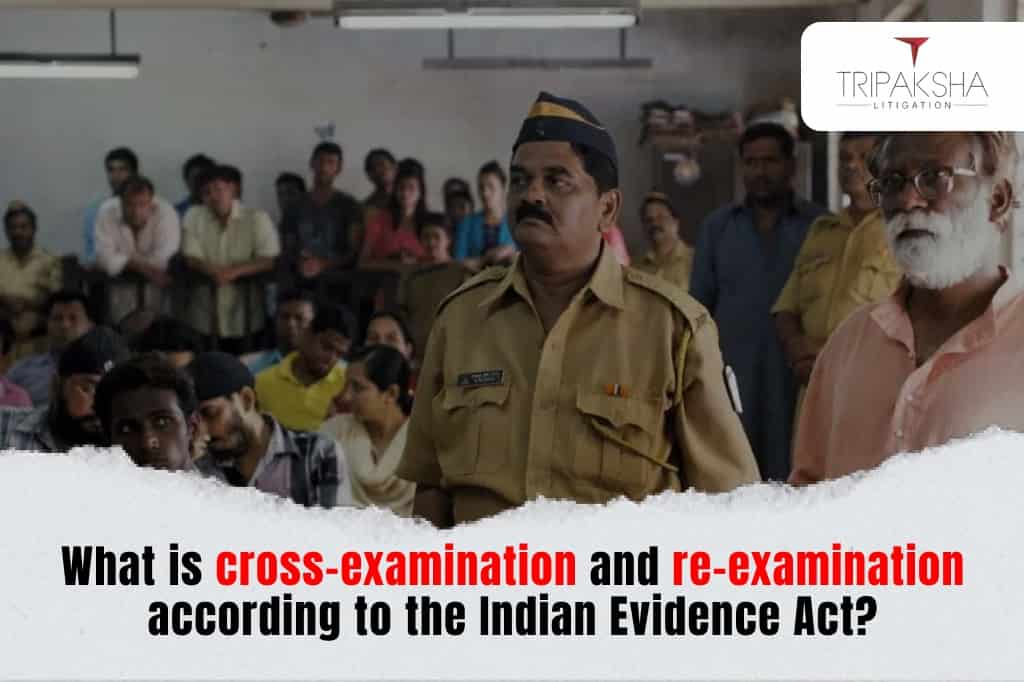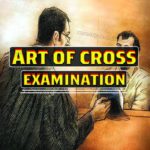Introduction
Examination of witness is necessary in order to prove the case of the respective parties and to disprove the case of adversary party to the suit. The plaintiff brings his own witness to establish his claim, and unless there is pleading, question of proof does not arise.
The term ‘examination’ is the process to ask relevant questions regarding the fact in issue to a witness. The stages of ‘examination’ include-
- Examination in chief,
- Cross-examination, and
- Re-examination
The Evidence Act in India prescribes the examination of witnesses in civil and criminal cases. In civil matters, the plaintiff has the right to begin (Order XVIII, Rule 3 of CPC), the prosecutor or complainant begins matters in a criminal case. The examination of a witness by the party calling him is chief-examination, and by the other party is cross-examination Section 137.
Relevant points regarding cross-examination
- A fair opportunity to cross-examine must be given to the opposite party.
- The adverse party has the right to cross-examine, but the party calling a witness can cross-examine if he turns hostile. A co-defendant can conduct cross-examination if his interest is adverse to that of the defendant.
- Without a chief examination, the cross-examination cannot be conducted.
- If any evidence produced by police on the interrogation of a witness is prejudicial to the accused, cross-examination without examination in chief is permissible.
- The court can question the witness if he is confused during cross-examination.
- Cross-examination is conducted viva voce.
- A fact is non-disputed after cross-examination if the opposite party fails to challenge any statement of fact made by a witness during the examination in chief.
- If the adverse party waives the right to cross-examine, they cannot make any grievances about it.
Aim and Purpose to cross-examine
As discussed above, it is the most effective tool in law to prompt the truth. It is required to give credibility to the testimony made by a witness. The evidence given by the witness is admissible when the opposite party tests the genuineness of the same by cross-examination.
It aims to discredit the accuracy, credibility, and value of the evidence stated by the witness during a chief examination. It also enables the cross-examining party to run through the material facts given by the witness to discover and reveal any inconsistencies, or to reveal any concealed information and facts which will strengthen the case.
Sec. 146 of the Evidence Act provides certain questions that can be asked during cross-examination. Questions can be asked for testing the veracity of the witness, questions shake his credit to know the truth etc. Sec. 148 of the Act provides the discretion of the Court where it can decide which questions are proper and which are improper.
Object of cross-examination
- Tending to test his means of knowledge.
- Tending to expose the errors, omissions, contradictions and improbabilities in his testimony.
- Tending to impeach his credit.
The basic objective of the cross-examination is to ascertain the truth from the testimony given by the witness. It is intended to suggest that the witness is not speaking the truth on particular point, it is necessary to direct his attention to it by questions in cross-examination.
In the case of Jayendra Vishnu Thakur vs. State of Maharashtra, the Supreme Court of India observed that the right to cross-examine is not only a natural right but also a statutory right.
In State of Karnataka v. Yarappa Reddy, the Supreme Court of India added that the basic requirement for adducing such contradictory evidence is that the witness, whose impartiality is in question, must be presented with evidence and asked about it and he should have denied it.
Questions lawful in cross-examination (Sec. 146)
A witness during cross-examination can be asked questions which tend to-
- Test his veracity
- Discover who he is and what is his position in life
- Shake his credit, by injuring his character
Such questions can be asked to the witness even if the answer to them might tend directly or indirectly to criminate the witness or expose him to penalty or forfeiture.
Amendment of 2002 to the Act inserted a proviso that says ‘In prosecution for rape or attempt to rape, it shall not be permissible to put questions in the cross-examination of the prosecutrix as to her general immoral character’.
Validity of cross-examination
In S. Amruta v. C. Manivanna Bhupathy, held that there would be no disqualification for a child witness and before the outcome of such cross-examination is accepted. It added that the evidence needs to be corroborated through a preliminary enquiry. It was further clarified that the court would not be allowed to permit a child to take oath for being incompetent to understand the consequences.
In the case of Laxman v. State, AIR 1974 SC 303– If there are omissions in the previous statements that are not contradictions but throw some doubt on the veracity of what was omitted, the uncertainty may be capable of removal by questions in re-examination.
Concept of re-examination
It is an act or process of examining one’s witness in the court or before an arbitrator once again after the witness has already been cross-examined by the counsel of the opposite party. As the expression suggests,‘re-examination’ means re-examining the witness by the counsel of the party who is relying on him. A witness may be re-examined only after cross-examination is done.
The purpose of re-examination is only to get clarification of some doubts created in cross-examination. The facts that have not been introduced till the stage of cross-examination cannot be introduced at the stage of re-examination.
Scope and object of re-examination
It must be noted that the new facts can be brought in at this stage only after due permission of the court. If the new facts are introduced at this stage of the trial that the right to further cross-examine the witness on the new facts shall accrue.
Re-examination and relevant provisions under the Evidence Act
Section 137- The provision says that the examination of a witness by the party calling the witness shall be called his examination-in-chief; the examination of a witness by the opposite party is called his cross-examination and the examination of a witness, after the stage of cross-examination by the party who calls him, shall be called his re-examination.
Section 138– It prescribes the order of examination and says that the witness shall be first examined-in-chief, then (if the adverse party so desires) cross-examined, then (if the party calling him so desires) re-examined. It also gives a statutory right to the party calling a witness to re-examine him after the cross-examination.
Objective of re-examination
In Rammi and Ors. v. State of Madhya Pradesh, the Apex Court has discussed very exhaustively the objective of re-examination.
- The object of re-examination is to explain matters that have brought out during the stage of cross-examination.
- The stage is not only there to clarify the ambiguities but it is also there if the party that has called the witness needs any explanation from the witness over the statement given during the cross-examination. Hence, it is a very important stage for the prosecution to put questions and examine the witness where there are certain queries or ambiguities and also where certain explanations are needed by the cross-examined witness.
- If any new fact or a new matter is elicited from the witness during re-examination, the same can be taken on record only by the due permission of the court. If the court finds that the new facts or the matters are relevant and necessary, then the court taken a liberal approach and allows the same to be taken on record.
Conclusion
The area and scope of cross-examination are very vast. In this article, although we couldn’t cover each aspect exhaustively by we have attempted to cover the elements of a good cross-examination. Constant training and practice is the only way to gain mastery over the art of cross-examination.
The stage of re-examination gives an opportunity to reconcile the discrepancies, between the statements in examination-in-chief and cross-examination. It also provides an opportunity to the parties to examine the statements inadvertently made at the stage of cross-examination or to remove confusions/ ambiguities in the deposition on the evidence by cross-examination.








